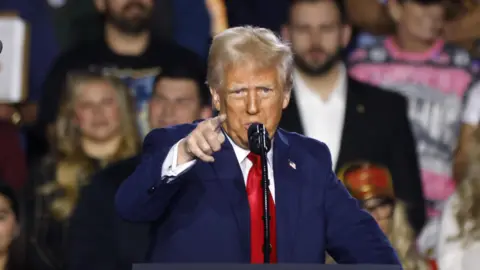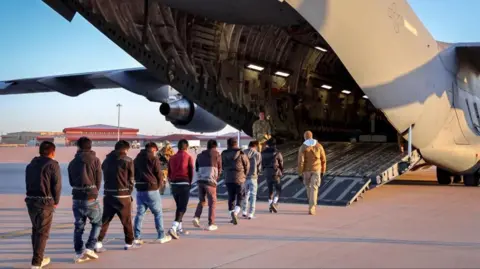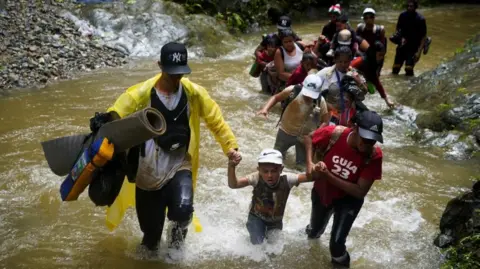Co-operate or else: Trump's Colombia face-off is warning to all leaders
 EPA
EPALess than a week into his presidency, Donald Trump has briefly engaged in his first international tariff dispute. And the target wasn't China, Mexico or Canada - frequent subjects of his ire - it was Colombia, one of America's closest allies in South America.
Colombia's offence was refusing to allow two US flights carrying deported migrants to land because they were military, not civilian, transport planes. That was enough to prompt Trump to threaten to drop the hammer.
"We will not allow the Colombian government to violate its legal obligations with regard to the acceptance and return of the criminals they forced into the United States," Trump posted on his social media site.
On top of the 25% tariffs he said he would impose, Trump said the US would introduce a travel ban and "immediate visa revocations" on Colombian government officials, as well as its allies and supporters.
But later, the White House said Colombia had now agreed to accept migrants arriving on US military aircraft "without limitation or delay". As a result, the US will not go ahead with the tariffs.
For his first week in office, the US president had seemed to be prioritising executive action on immigration over trade measures - even if the latter were a key campaign promise. As if to drive that point home, Trump now appears ready to punish nations that he views as not sufficiently supporting America's new hard-line immigration polices.
He is serving a warning to US allies and adversaries alike: If you don't co-operate with the US, the consequences will be severe.
 US Government
US GovernmentColombia has backed down from a tariff war, but the tactic poses a test for the new Trump administration.
If future sanctions lead to higher prices for US consumers, will the American public object? Will they be willing to tolerate some financial pain incurred to advance Trump's immigration priorities?
The US imports about 27% of its coffee from Colombia, according to the US Department of Agriculture, as well as other goods like bananas, crude oil, avocados and flowers. The coffee imports alone are worth nearly $2bn (£1.6bn).
Colombian President Gustavo Petro had initially responded by saying his country would accept repatriated citizens on "civilian planes, without treating them like criminals".
It's no secret that Petro doesn't like Donald Trump – he's heavily criticised his policies on migration and the environment in the past.
In a lengthy response on X, he said Trump would "wipe out the human species because of greed" and accused the US president of considering Colombians an "inferior race".
Petro went on to describe himself as "stubborn" and said that while Trump could try to "carry out a coup" with "economic strength and arrogance" he would, in short, fight back.
Most significantly, Petro said: "From today on, Colombia is open to the entire world, with open arms."
- Six big immigrations changes under Trump - and their impact so far
- Surge of children crossing the Darien Gap jungle
- Millions more Colombians living in conflict zones
This is something that should worry a US president who wants to tackle migration. His incoming administration officials have made clear that that mission will require looking beyond the Mexico border.
Trump's pick for deputy Secretary of State, Christopher Landau, has long argued that "working with other countries to stop such migratory flows" must be a "global imperative of US foreign policy". Sunday's spat might make working together a lot less likely.
Tens of thousands of migrants every year from around the world, from India to China, head north towards the US after landing in South America and travelling up through Colombia across the Darien Gap – a key choke point just north of the Panama-Colombia border. It's a dangerous journey usually facilitated by criminal gangs.
 Reuters
ReutersIn his response to Trump's actions, President Petro noted that if talks over managing migration through Darien were suspended, "illegal activities will increase". Those comments could be viewed as a veiled threat of more undocumented migrants on the way.
Petro was quick to say that his country would not refuse Colombian nationals deported from the US - only that they must receive "dignified treatment".
Even after Colombia acted to defuse the row, it said a dialogue would be maintained to "guarantee the dignity of our citizens".
But these kinds of tariffs are a test of will - and could still be applied to other nations that do not agree to the US's demands. From the looks of it, this is just Trump's opening move.
